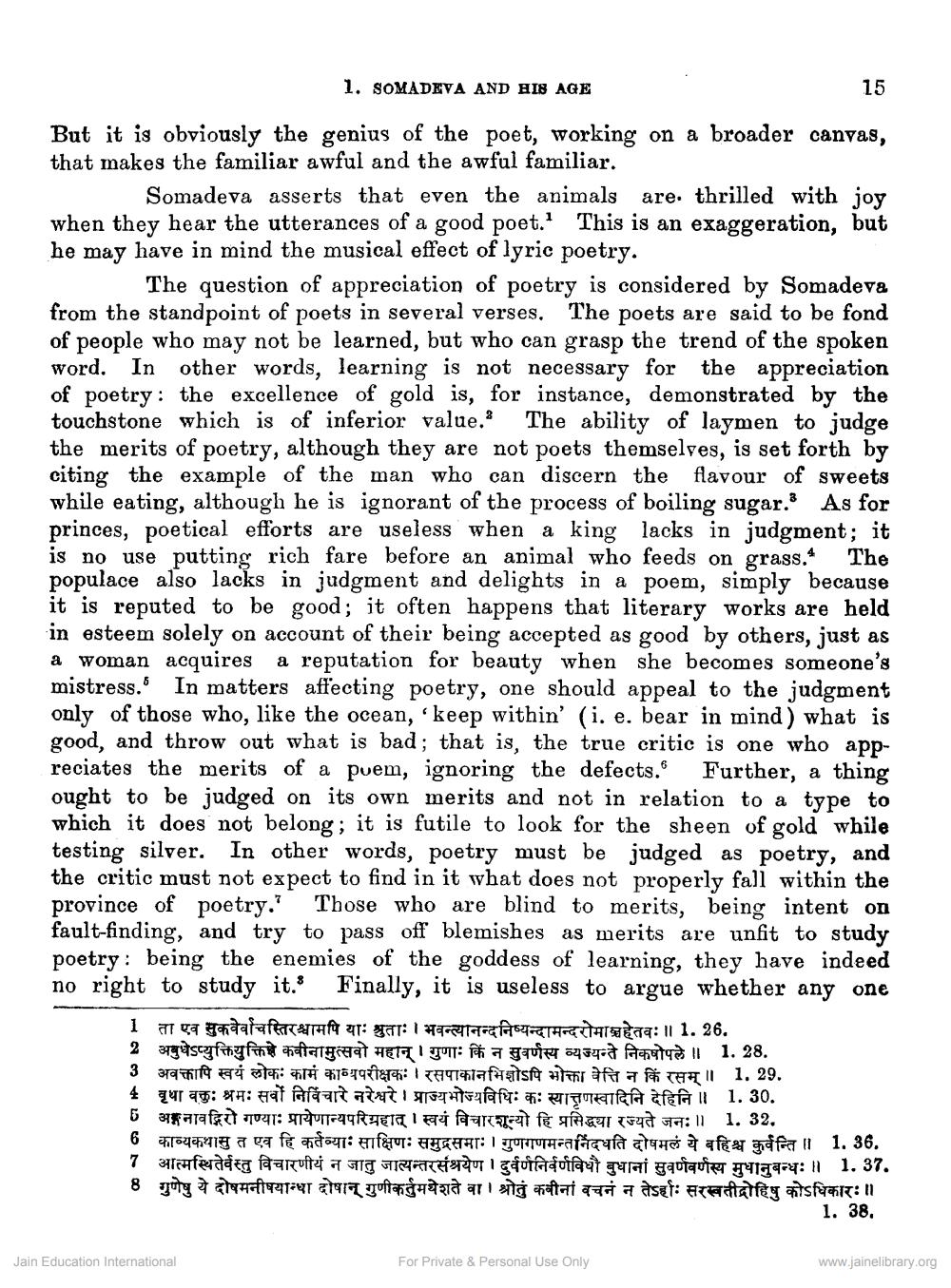________________
1. SOMADEVA AND HIS AGE
15
But it is obviously the genius of the poet, working on a broader canvas, that makes the familiar awful and the awful familiar.
Somadeva asserts that even the animals are. thrilled with joy when they hear the utterances of a good poet. This is an exaggeration, but he may have in mind the musical effect of lyric poetry.
The question of appreciation of poetry is considered by Somadeva from the standpoint of poets in several verses. The poets are said to be fond of people who may not be learned, but who can grasp the trend of the spoken word. In other words, learning is not necessary for the appreciation of poetry: the excellence of gold is, for instance, demonstrated by the touchstone which is of inferior value. The ability of laymen to judge the merits of poetry, although they are not poets themselves, is set forth by citing the example of the man who can discern the flavour of sweets while eating, although he is ignorant of the process of boiling sugar. As for princes, poetical efforts are useless when a king lacks in judgment; it is no use putting rich fare before an animal who feeds on grass. The populace also lacks in judgment and delights in a poem, simply because it is reputed to be good; it often happens that literary works are held in esteem solely on account of their being accepted as good by others, just as a woman acquires a reputation for beauty when she becomes someone's mistress. In matters affecting poetry, one should appeal to the judgment only of those who, like the ocean, 'keep within' (i. e. bear in mind) what is good, and throw out what is bad; that is, the true critic is one who appreciates the merits of a puem, ignoring the defects. Further, a thing
; to be judged on its own merits and not in relation to a type to which it does not belong; it is futile to look for the sheen of gold while testing silver. In other words, poetry must be judged as poetry, and the critic must not expect to find in it what does not properly fall within the province of poetry. Those who are blind to merits, being intent on fault-finding, and try to pass off blemishes as merits are unfit to study poetry: being the enemies of the goddess of learning, they have indeed no right to study it. Finally, it is useless to argue whether any one
mia tafar: 1: RTLETT 34 Tahoe grife!
1 va undatafretha at: 7:
1
5 4TH GETA : 11 1. 26. 2 gascyfthyfth attachat HETTI TUT: P a Tavirt474a Peta II 1. 28. 3 अवक्तापि स्वयं लोकः कामं काव्यपरीक्षकः। रसपाकानभिज्ञोऽपि भोक्ता वेत्ति न किं रसम् ॥ 1. 29. quag: 4: Hat Arart arti faf: : PUTETTA a
1. 30. 6 अङ्गनावद्रोि गण्याः प्रायेणान्यपरिग्रहात् । स्वयं विचारशून्यो हि प्रसिद्धया रज्यते जनः॥ 1. 32.
काव्यकथासु त एव हि कर्तव्याः साक्षिणः समुद्रसमाः । गुणगणमन्तनिंदधति दोषमलं ये बहिश्च कुर्वन्ति ।। 1.36. 7 आत्मस्थितेर्वस्तु विचारणीयं न जातु जात्यन्तरसंश्रयेण । दुर्वर्णनिर्वर्णविधौ बुधानां सुवर्णवर्णस्य मुधानुबन्धः॥ 1.37. 8 गुणेषु ये दोषमनीषयान्धा दोषान् गुणीकर्तुमयेशते वा । श्रोतुं कवीनां वचनं न तेऽर्हाः सरखतीद्रोहिषु कोऽधिकारः॥
1. 38.
1.37.
Jain Education International
For Private & Personal Use Only
www.jainelibrary.org




